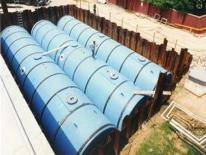
Notice of Proposed Rulemaking - Underground Storage Tank Regulations
DOEE has listened to concerns and appeals to revise the aged tanks regulations. The UST rule requiring the removal of aging tanks over 30 years old has been revised to offer more flexibility while maintaining safety standards. Comments on the proposed rulemaking should be submitted in writing no later than thirty (30) days after the publication. Read More>>
Through storage tank regulation, licensing, and enforcement, DOEE's Underground Storage Tank (UST) services protect human health and the environment from the adverse effects of petroleum, petroleum-related products and hazardous materials from USTs in the District. UST is organized into two programs: Underground Storage Tanks (UST) and Leaking Underground Storage Tanks (LUST).
Underground Storage Tanks (UST) - This program oversees the installation of new tanks, and the operation, maintenance, and closure of existing tanks.
- Forms, Guidance, and Public Documents: These documents help regulated entities and individuals understand and comply with District law related to USTs.
- Operator Training: UST operators in the District must take DOEE-approved training, which can be found here. Additionally, this link provides guidance for delivery training provider requirements and required training for Class A, B, and C Operators.
- Certifying UST Contractors: Individuals and businesses that perform underground storage tank removal, installation, testing, closure, and related work must be certified by DOEE.
- Underground Storage Tank Database
Leaking Underground Storage Tanks (LUST) - This program manages the cleanup of areas impacted by leaking tanks, ensuring that risks to human health and the environment are reduced and eliminated.
- Cleanup Standards: When remediating a site with a leaking tank, the site must meet certain cleanup standards.
- Voluntary Remediation Action Program (VRAP): VRAP assists entities that voluntarily seek to cleanup sites with leaking tanks.
- Forms, Guidance, and Public Documents: These documents assist regulated entities and individuals understand and comply with District law related to LUSTs.
Green and Sustainable Remediation (GSR) Guidance: The UST Branch introduces this GSR Guidance to advance the goals of Sustainable DC 2.0 and uphold the DOEE’s mission, vision, and values. While adopting GSR practices remains voluntary, our aim is to inform and encourage the regulated community and stakeholders to incorporate GSR principles into their remediation efforts. Our long-term objective is to ensure that all Underground Storage Tank (UST) and Leaking Underground Storage Tank (LUST) cleanups are conducted using sustainable practices as outlined and recommended in this guidance, promoting environmental responsibility and sustainable outcomes. Read more about the GSR Guidance.

